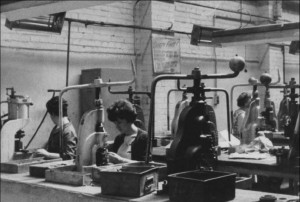
with women at work, 1950s
A NEW project has set out to tell the tale of the vital role that women played in manufacturing industries across Wales.
Voices from the Factory Floor will see the stories of women like Gwen Eira Evans, who worked in a factory in Felinfoel, take centre stage, and guarantee that their voices are not forgotten.
The Voices from the Factory Floor project includes oral interviews, full transcripts of the recordings, and photographs documenting the history of women who worked in factories across Wales during a thirty year period between 1945 and 1975. The project is led by Women’s Archives Wales, with support from the Heritage Lottery Fund
From Gwen Eira Evans’ tales of producing radiators for cars and aeroplanes in Felinfoel to Moira Morris’s stories of making men’s watches at Tick Tock in Ystradgynlais and Yvonne Stevens’ toy-making memories at Bacon Toy Factory, Llanrwst, where she later met her husband – over 200 such stories have now been documented in the project, reflecting an important period in Welsh manufacturing which underlines the vital role women played.
Catrin Stevens, the project’s co-ordinator, explains why she feels projects such as Voices from the Factory Floor play a fundamental role in capturing bygone women’s history: “Women’s history has, on the whole, been ignored and neglected through the centuries and the Women’s Archive of Wales’s aim is to raise awareness of women’s history and to rescue and safeguard the sources of this history. This specific project is extremely important as it recognises the important role Welsh women played in the resurgence of manufacturing, following the war. Their stories reflect a challenging work environment, while at the same time, show there was a strong sense of camaraderie and plenty of fun to be had at the work seaside trips to places like Tywyn and Blackpool. While the archive is fascinating for us now, in years to come it will be an invaluable source for those wishing to learn about Welsh life in this period.”
The stories have been captured because of a grant awarded by the Heritage Lottery Fund, and Head of HLF Wales Richard Bellamy believes that using Lottery money for projects like this is vitally important in keeping the country’s unwritten history alive: “Our heritage takes many different forms, and it is important we recognise this when considering how Heritage Lottery Fund money is distributed. Voices from the Factory Floor tells an important story and reflects on a key period in Welsh life, a period of change in our culture and in our ways of working. I would encourage everyone to log on and get lost in these factory tales – I guarantee you will discover an enchanting – and perhaps unexpected – women’s working world, helping us to discover who they and indeed we are, and where we’ve all come from, given the majority of these factories have now closed.”
One of the project’s contributors, Gwen Eira Evans, talks about her job she began in the 1940s when the Morris Motors factory opened in Felinfoel after the war broke out. She was 18 and knew nothing of Morris Motors but stayed there for 37 years doing the same job.
“My first job was on a farm when I was 14. You had to work for nothing. I got up at 6am and finished work at 7pm and sometimes later in the summer. I applied in person at the factory when I was old enough and my pay was double. I earned £9 per week, depending on how much work I did. I made radiators for cars and aeroplanes; the work was hard as I had a weak arm. When I started I thought the factory was enormous as there were more than 2000 workers, including many girls from Ponthenri. I caught the private bus at 6am as work began at 7.30am with a 10 minute tea break at 9.30am. There was a half- hour lunch break and work finished at 4.30-5pm. Workers weren’t permitted to be more than 2 minutes late for work. Any worker clocking in 3 minutes late was docked a quarter of an hour’s pay. Many girls stayed for years. Many had stuck it out during the war years because had they left, they knew, they would be compelled to work somewhere else possibly far away from home.”
A new film to promote the project has been launched this week at the Senedd and all materials will soon be transferred to the National Screen and Sound Archive at the National Library in Aberystwyth.
















Add Comment